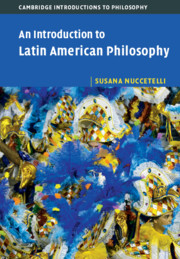Book contents
- An Introduction to Latin American Philosophy
- An Introduction to Latin American Philosophy
- Copyright page
- Dedication
- Contents
- Tables
- Preface
- 1 Setting the Scene: The Iberian Conquest
- 2 Modest and Immodest Feminism
- 3 The Authoritarian Republicanism of Bolívar
- 4 The Liberal Republicanism of Sarmiento and Alberdi
- 5 Homegrown and Imported Positivism
- 6 Martí’s Liberal Anti-Positivism
- 7 Utopian Latin Americanism: Arielism and Mestizofilia
- 8 Soft and Hard Socialism
- 9 Liberation Theology and Philosophy
- 10 Skepticism and Anti-Skepticism About Latin American Philosophy
- Glossary
- Bibliography
- Index of Names and Subjects
- References
9 - Liberation Theology and Philosophy
Published online by Cambridge University Press: 15 October 2020
- An Introduction to Latin American Philosophy
- An Introduction to Latin American Philosophy
- Copyright page
- Dedication
- Contents
- Tables
- Preface
- 1 Setting the Scene: The Iberian Conquest
- 2 Modest and Immodest Feminism
- 3 The Authoritarian Republicanism of Bolívar
- 4 The Liberal Republicanism of Sarmiento and Alberdi
- 5 Homegrown and Imported Positivism
- 6 Martí’s Liberal Anti-Positivism
- 7 Utopian Latin Americanism: Arielism and Mestizofilia
- 8 Soft and Hard Socialism
- 9 Liberation Theology and Philosophy
- 10 Skepticism and Anti-Skepticism About Latin American Philosophy
- Glossary
- Bibliography
- Index of Names and Subjects
- References
Summary
During the second half of the twentieth century, some Latin American intellectuals put theology and philosophy at the service of explaining and solving the social and economic disparities facing the region. Paradigm results of this development were the liberation theology of Gustavo Gutiėrrez and the liberation philosophy of Enrique Dussel. Chapter 9 considers these attempts to establish the causes of oppression and become the voice of a vaguely defined group of people, the Latin American poor. Other categories of liberation theology and philosophy examined here include the center-periphery distinction and the very notion of liberation, which are adaptations of categories from dependency theory and Marxism respectively. The chapter argues that neither liberation theology nor liberation philosophy can accommodate strong intuitions about justice. They also rely on discredited assumptions from dependency theory. In addition, liberation philosophy faces some problems of its own, since it makes misleading and often false claims about events and rival philosophical theories. To illustrate these problems, the chapter looks closely at Dussel’s claim that all Western philosophy suffers from ideological contamination.
Keywords
- Type
- Chapter
- Information
- An Introduction to Latin American Philosophy , pp. 204 - 230Publisher: Cambridge University PressPrint publication year: 2020

